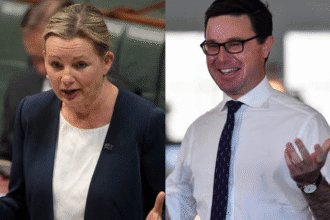Controversial Image Sparks Apology
Following the publication of a picture depicting him executing a Nazi salute, Patrick Delaney, the CEO of Foxtel, a 75% News Corp-owned cable television business in Australia, formally and “unreservedly apologize”. Recently discovered, the picture goes back ten years and has caused a lot of debate and criticism.
Delaney expressed contrition in an internal email sent to Foxtel employees, saying, “Regardless of the context, the fact I demonstrated this offensive salute was wrong.” Delaney clarified that he thought he was copying a move made by Western Sydney Wanderers soccer team supporters during the 2014–15 season. Delaney claims that as the CEO of the channel, he was attempting to replicate a menacing posture taken by a group of supporters on a visit to the Fox Sports facility. “I was trying to show a menacing gesture made by a group of fans,” he said.
Jewish Council of Australia Condemns Actions
Delaney’s activities have drawn harsh criticism from the Jewish Council of Australia as “deeply concerning.” Emphasizing the broader consequences, the council’s executive officer council’s executive officer pointed out, “equally [concerning] is that he works in a media sector where he felt this was somehow okay.” Not only for Jews but also for other coloured groups, the salute is disrespectful and aggressive behavior not only.
The council’s response emphasizes the gravity of the problem by underlining that the Nazi salute is not just a historical emblem but also a very nasty gesture with ongoing adverse effects. Declining the irony of Delaney’s circumstances, the executive officer said, “The idea that Mr. Delaney could sign a letter condemning antisemitism while also feeling comfortable doing a Nazi salute is proof that our nation needs more than superficial pledges.”
Delaney's Response and Reflections
In his internal message, Delaney tried to resolve the issue by considering the meaning of the picture. He said he had been “searching [his] mind” for a scenario whereby such a picture may be justified. With his “values, beliefs, and family connections,” Delaney said the picture is “completely inconsistent” and underlined his will to fight racism in all its manifestations.
Delaney also mentioned his involvement in the “Say No to Anti Semitism” letter, signed by eminent Australian leaders in reaction to the recent attack on southern Israel carried out by Hamas. Along with 251 hostages taken, this incident claimed the lives of about 1,200 individuals. Delaney underlined his continuous dedication to combat racism and his plan to keep contacting Jewish leaders to “express my deep regret.”
Broader Context of Antisemitism and Islamophobia
Delaney’s dispute arises at a period when Australia is struggling with a notable rise in both Islamophobia and antisemitism. Rising communal tensions brought on by the Israel-Gaza conflict have heightened worries about hate crimes and discriminatory activities. Reacting to this rise in antisemitism, the federal government designated a special envoy in July to address the matter and has committed to creating a comparable position to fight Islamophobia in the not-too-distant future.
During a recent trip to Sydney, Lachlan Murdoch asked the News Corp workforce to “address and tackle” all kinds of antisemitism. Murdoch underlined the company’s dedication to facing hatred and advancing inclusiveness by stressing that there should be “no room for equivocation”
Foxtel's Declining Business Model
Once a mainstay of Australian homes, Foxtel has recently seen a notable drop in its business model. The emergence of less expensive foreign streaming services has helped to explain its declining importance in the cutthroat media scene. Once known in Australia as cable television, the corporation is now under pressure from a range of new, more reasonably priced entertainment choices.
Given these continuous challenges, News Corp has lately said it is considering selling Foxtel. This possible change has been spurred by the pay-TV firm’s poor performance and changing customer tastes toward streaming platforms. Although the result of this deliberation is unknown, it emphasizes the general difficulties conventional media firms now face in the digital age.
While Foxtel negotiates these obstacles, the debate about Delaney complicates the company’s circumstances, further aggravating its attempts to rebuild public confidence and stability.








